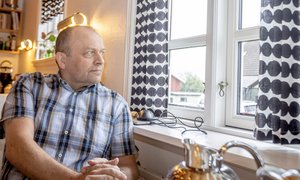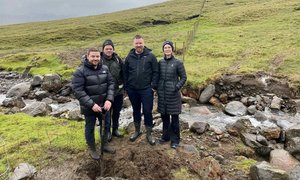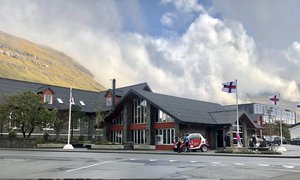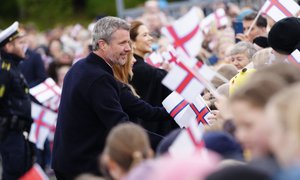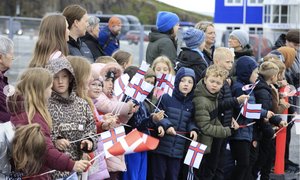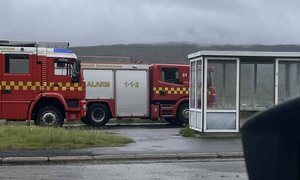The Faroese welfare state has great challenges ahead. Globalisation offers possibilities but also strains the economic sphere whilst growing demands from citizens and the labour market create outcomes of apt and flexible welfare services of high standards.
This is why Føroya Landsstýri - the Faroese Government - has implemented a long-term strategy process of the title ‘Vision 2015’. In this vision-plan which amongst others touches subject areas such as diversity of industry, research, innovation and globalisation, the very foundation is the development of the Faroese welfare society. This is why we for the first time with Vision 2015 have made strategic comprehensive plans for welfare of all the most important welfare-political frameworks in order to reach a main objective: to ensure an excellent society for all citizens.
Dual Strategies for Welfare
The vision of welfare originates in a political ambition and it aims for a social system which both:
• promotes equality, well-being and reliance; and which
• at the same times generates innovation, cooperation and growth.
From a liberalistic market philosophy these two dimensions may seem antagonistic to one another. Yet, this is exactly what our welfare project attempts – namely to create an atmosphere in which social, industrial and economic spheres come together in a expanding dialectic synthesis. This is how we will achieve to be amongst the most advanced nations.
We see great ideals in the Nordic welfare model:
• with structures and finance of universal welfare services based on solidarity principles,
• with active, family-friendly, flexible labour market policies,
• with extensive public and private investments in education, research and innovation,
• with social capital, trust and abilities to combine forces between citizens, organisations, institutions, corporations and political systems – and
• with the highest fertility rate in Europe creating well-being and continuing availability on the labour market. Thus the foundation for a social economic balance between generations is strengthened.
Solely based on these principles, we ought to be capable of overcoming the challenges from global economic competition, the tendencies to increased social marginalisation as well as changes in ideological positions on welfare.
Solidarity is the Foundation
We want the Faroe Islands to be equally good for everyone, i.e.
• That the Faroese people must thrive, develop and flourish,
• That all citizens with no regard to social or personal situation are ensured all necessary conditions for good opportunities in a well organised welfare state,
• That responsibility between the citizen and the authority as well as solidarity is highly valued,
• That rights and access to necessary public health services for the citizens are ensured,
• That we set demands to constant qualitative, structural and financial development of our welfare system.
Therefore we plan strategically for our welfare in the future.
Inclusive and active citizenship
In health policy an intensive effort for public health is highly prioritized on the political agenda. We focus on physical activity, nutrition, smoking and substance abuse. Additionally we are working on public healthcare structures of excellent standards where the primary and secondary healthcare networks – amongst others with new pioneering IT systems – are integrated coherently into the process of treatment.
Welfare of children and adolescents is another distinctive feature of our concerns. The principle of sector responsibility and cooperation amongst all authorities in question has to be adapted and improved. Another aim for this subject matter is that the working life of families with children should be adjusted to their specific needs and abilities.
Welfare of the functional disabled is the best unit of measurement for our means to create the ‘good’ society, that prompts inclusion of citizens – whilst it hinders social exclusion. The essential concerns regarding this are opportunities and options for rehabilitation, unimpeded access to buildings and means of communication, accommodation alternatives, educational, labour and income possibilities. And as far as possible, the physically and mentally disabled ought to be financially self-sufficient and take part in the role of active citizenship.
Solidarity between generations ensures welfare of the elderly. With public pension structures we ensure a financial income basis for the life of the elderly, which we can build upon with trade-union and private pension fonds. The public structures regarding care for the elderly suffices necessary support in every-day-life; for those who live at home and those that are so weak that they require daily assistance on residential homes. The legal framework in regards to welfare of the elderly will be carried out in a new law that ensures the elderly citizens’ rights and options.
The Welfare System Strengthens the Availability of Competition.
Our objective is to incorporate at a society:
• without significant inequalities between citizens in regard to education, employment, income, residence and other basic social rights,
• where citizens can take part and function individually and collectively side by side,
• where all citizens are able to work and participate according to ability,
• which gives all citizens the opportunity to use their capacity to lead a satisfactory life.
Compared to all parameters of competition, the Nordic countries are immensely successful. They are amongst the richest countries in the world with a first-class social environment – whilst being aptly competitive, safe and incorrupt. Internationally, the Nordic region are winning countries - with high salaries and taxation. And it is the Nordic welfare system which enables such apt and competent competition. On the Faroe Islands we work purposely to become a part of this Nordic welfare success, implementing societal, competitive competence and industrial and social as well as economic welfare for all.
Hans Pauli Strøm,
Minister of Health and Social Affairs








